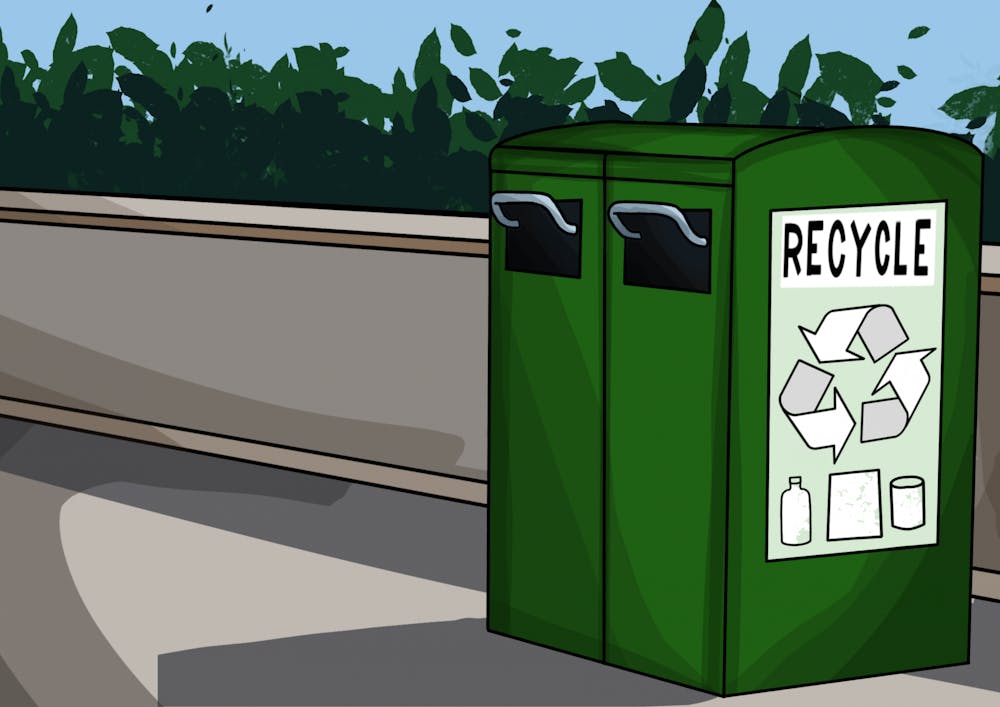In a push to become more sustainable, USC recycled 30% of all trash on campus in 2020, an increase from 12% in 2012.
The university currently recycles thirty different materials, according to the waste and recycling manager, Dameon Hopkins.
Half of the materials are entirely handled in-house by the campus recycling crew and include mixed paper, cardboard, plastics and aluminum. The other half of the materials are recycled by the university with a third-party entity's help, which includes scrap metal, E-waste, food donations, and construction/demolition materials.
Second-year marine science major and Residence Hall Association (RHA) member Maggie Gaspar said there are recycling bins at every on-campus housing location.
"Most residence halls at least have paper recycling," Gaspar said. "Of course, places like Green Quad have recycling for every single type of material, including batteries and electronic waste, but at the moment, all on-campus residences do have at least an inclusion for paper recycling."
There are two main recycling methods conducted on campus: dual-stream recycling and mixed stream recycling.
Dual-stream recycling is a method that requires source-separating, as different types of materials are placed into different bins. Mixed collection or single-stream recycling, on the other hand, doesn't separate materials, and all recyclables are collected in one bin.
Dual-stream recycling tends to be more efficient and avoids cross-contamination, which occurs when materials are not sorted into the right bins.
Director of the Office of Sustainability, Larry Cook, said they opted to introduce some mixed collections because of the lack of space in certain buildings.
"It's hard to have enough bins to be source-separated; you just can't have them everywhere, so one bin for trash and one bin for all recyclables takes up a lot less space," Cook said.
Hopkins said to avoid the cross-contamination produced through the single-stream collection, the university now has an on-campus sorting facility where all recyclables are hand sorted before being sent off.
"Us as a recycling crew here in-house, we actually get on site and hand sort the material ourselves to make sure that the cross-contamination doesn't leave the university's campus," Hopkins said.
Hopkins also said the custodial staff collects the recycling bins on campus everyday and delivers them to the recycling crew.
"The recycling crew then, in turn, collects those bags from each particular building and brings them to the sorting site, where then the sorting [at the] site is done daily," Hopkins said.
As recycling has continued to grow in scale, it has also become more efficient. The university's diversion rate increased from 12% in 2012 to 30% in 2020. The diversion rate refers to the percentage of waste (usually measured in tons) recycled or reused instead of being disposed in a landfill.
As a result of fewer people being on campus due to COVID-19, the amount of waste recycled decreased from 1,482.6445 tons diverted in 2019 to 1,376.8 tons in 2020. However, despite the drop in volume, the efficiency still improved from 2019, which had a diversion rate of 26%.
In 2020, USC is in the middle of the pack in diversion rate compared to other colleges that have recycling programs. The University of Illinois's diversion rate is 29.44%, while Auburn University's rate is 40% and the University of Massachusetts-Amherst (UMass) posted a 53% rate.
USC recycled 1,376.8 tons of materials in 2020. Auburn and Illinois recycled fewer materials, with 527 and 1,786 tons, respectively. UMass recycled the most materials of the four schools — 2,767 tons.
USC's diversion rate is growing, Cook believes the adoption of composting is a key reason.
"We added that in 2016 to most major dining facilities. We have a contractor that comes and they collect the prep waste and any plate scrapings that are collected, or any food that has been left out too long and can't be donated ... I believe we do around 250 thousand pounds of food waste every year," Cook said.
To expand recycling, Gaspar said the RHA is pushing to introduce more recycling options to off-campus housing in the future.
"Since we've got so many more apartment complexes off-campus ... I've begun trying to start some recycling initiatives over there," Gaspar said. "Everything that the on-campus residents can do, we want the off-campus [residents] as well."

